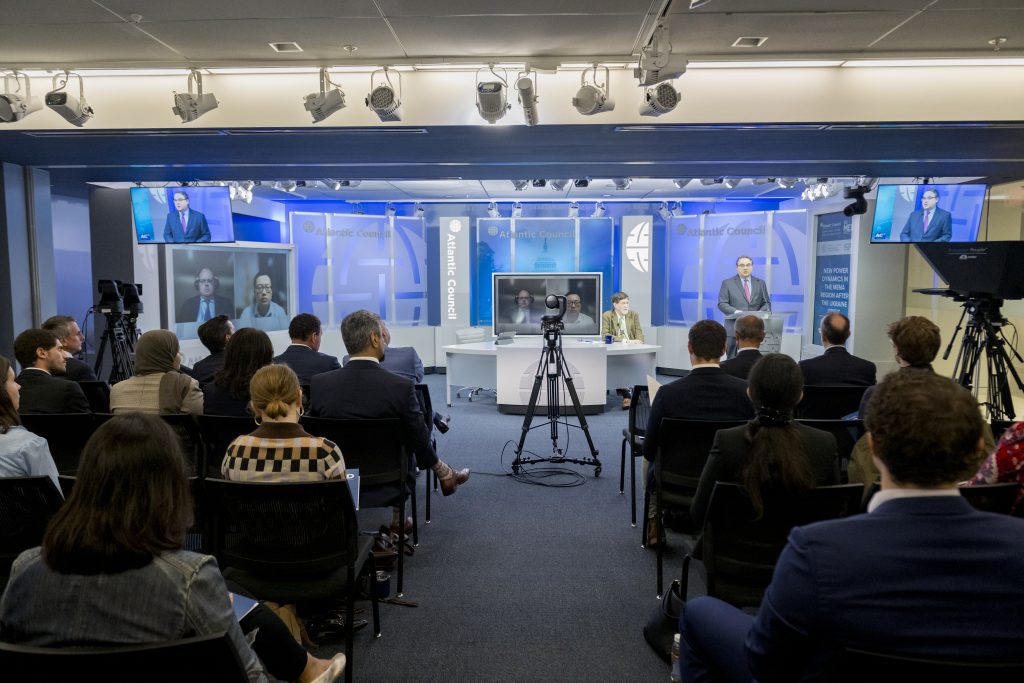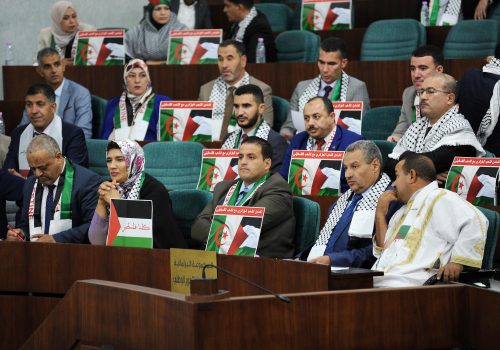Introduction
On September 18, 2023, the Atlantic Council’s North Africa Program in partnership with the Italian Institute for International Political Studies (ISPI) hosted a hybrid event, “New Power Dynamics in the MENA Region after the Ukraine Crisis.” The event featured an array of expert panelists who shed light on regional tensions, cooperation patterns in the eastern Mediterranean, and North Africa’s role in regional and international power competition.
The event opened with remarks by Fred Kempe, President and CEO of the Atlantic Council; Alessandro Gonzales, Deputy Chief of Mission of the Italian Embassy to the United States; and Giampiero Massolo, President of the Italian Institute for International Political Studies (ISPI); with closing remarks by Lorenzo Fruganti, Junior Research Fellow, Institute for International Political Studies (ISPI). The discussion encompassed three thought-provoking panels, each featuring renowned regional experts and practitioners. Each section was moderated separately to facilitate diverse questions and was followed by a Q&A session.
Takeaways
I. Shifting Relations Since the Ukraine War
The ongoing conflict in Ukraine has raised questions about many of the assumptions of the United States led global order. At the outset of Russia’s invasion of Ukraine, it was presumed that America’s partners in the Middle East would perceive Russia as a threat, as Western countries did. This, however, proved to be incorrect. The United States failed to recognize discontent among its Middle Eastern partners. Dr. Mark Katz explained that due to the perceived inadequate support from the United States in the region – notably the absence of US intervention following the Iranian drone strikes on Saudi Arabia in 2019 and criticism directed at specific governments, such as candidate Biden’s statement to treat Saudi Arabia as a pariah state – MENA countries did not feel obligated to back the United States against other global powers.
Many policy experts also predicted that Russia’s presence in the region would diminish following its invasion of Ukraine. Instead, Moscow managed to bolster its position despite the economic challenges manifested by the war. Nikolay Kozhanov, in an effort to explain this phenomenon, pointed to Russian President Vladimir Putin’s leveraging of economic advantages and resources in the Middle East and North Africa. Russia provides, for example, essential agricultural supplies to countries like Egypt. These pre-existing relationships have allowed Russia to manage its economic situation while maintaining an influential role and exerting power in the region, especially in the face of global shortages.
The Russia-Ukraine war has also highlighted the importance of relations in the face of global power competition. China, while seeking to bolster its own power, must balance its relationship with the United States and simultaneously support Russia and North Korea in their confrontations with the West. China’s role is further complicated, Gangzheng She noted, by its evolving role in the Middle East. While Russia is reliant upon China, Gulf states have options. They consider China as a contributor or an alternative option to their interests and security but are unlikely to purposefully diminish their relationship with the United States. In essence, currently in the process of understanding its global role and is hedging its bets rather than adopting a definitive stance in the region. For example, while China actively participated in peace negotiations between Riyadh and Tehran, it maintained a more reserved posture to prevent further regional escalation, distinct from its 1950 North Korea war involvement.
II. Tensions and Cooperation Patterns in the East-Med
Over the past decade, new leadership has emerged in the Eastern Mediterranean as economic and political conditions have evolved, creating new patterns of tension and cooperation. The 2015 discovery of the Zohr gas field in Egypt’s Exclusive Economic Zone marked a new chapter in its economic ventures as well as its bilateral relations. The resources enabled Egypt to foster greater economic ties with Israel through liquefied natural gas (LNG) initiatives. According to Dalia Ziada, Egypt’s leadership role in the Eastern Mediterranean was not premeditated, rather it emerged organically from economic imperatives and national security considerations. Egypt’s newfound leadership did not go unopposed. It faced, what Ziada termed “Eastern Mediterranean momentum,” stemming from Turkey’s intervention in Libya. But this momentum is also what drew global attention to the region’s geostrategic significance, positioning Egypt as a key player.
Like with Egypt, the discovery of natural gas reserves in Israel’s Exclusive Economic Zone changed the scope of its interests. Natan Sachs pointed out that while there were obvious economic benefits from this discovery, especially considering the surge in gas prices caused by the war in Ukraine, it also created new concerns for regional dynamics. The natural gas reserves, for example, created security challenges as they could be a target of Hezbollah attacks on maritime facilities. Diplomatically, Israel is also in a tricky position. While the United States is a major ally of Israel, it must maintain relations with Moscow, given Russia’s presence in Syria. Sachs concluded that Israel must aim to maintain a pragmatic approach, striving to strike a balance between the United States and Russia while safeguarding its security interests.
Despite the prevalence of competition in the Eastern Mediterranean region, the past year has displayed signs of increased cooperation and adjustment to the economic powers of Egypt and Israel. Turkey’s unequivocal support for the Muslim Brotherhood and Hamas strained regional relations, especially with Egypt and Israel. Consequently, Turkey saw an increased marginalization in the region, which Soner Cagaptay explained, led to a twofold response: military action in the Libyan civil war and improved diplomatic relations with Egypt and Israel. General Haftar of Libya’s eastern government sought to take control of Libya’s western capital city Tripoli. While Haftar had support from certain Emirati, Egyptian, Greek, and Russian factions, the United States and the West opposed this new offensive. Turkey’s military intervention, which prevented Haftar from succeeding, was met with praise from the West and allowed a favorable recalibration of Turkey’s position in the region.
Simultaneously, in an effort to end its regional isolation, Turkey sought to improve diplomatic relations with Egypt and Israel. Turkey hoped to align itself with what Cagaptay termed as the “new Middle Eastern quad” of Egypt, Israel, the UAE, and Saudi Arabia. This diplomatic process required significant political concessions, most notably discontinuing public support for the Muslim Brotherhood, and consenting to a power-sharing arrangement in Libya. The agreement required Turkey to acknowledged Egypt’s sphere of influence in the East but preserved its own influence in the West. This realignment was marked by the meeting of President Erdogan and President Sisi for the first time in a decade. Turkey, at the time, had also begun pursuing stronger ties with Israel by encouraging robust economic cooperation, energy collaboration, and pipeline diplomacy.
III. The Role of North Africa in Regional and International Power Competition
North Africa has historically avoided great power competition between Russia, China, and the United States, but is now drawn in by the effects of the Ukraine war. While Russia’s interests in the MENA region have not changed, the means through which Russia exerts influence in North Africa have evolved. Jon B. Alterman emphasized how these means, such as the deployment of the Russian affiliated private military corporation Wagner Group, complicate the situation in the region, specifically in Libya and may impact Egyptian investments in Russia.
While Russia is playing an indirect but active role in North Africa, Alessia Melcangi noted the change in European policies and approaches toward the Mediterranean and North Africa. She observed a shift from active engagement to a more passive stance. This trend is especially prevalent among European countries and their former colonies. Melcangi contends that this transformation is a critical oversight. The diminishing role of Europe in the region creates a void for other actors to fill and could create a new front for great power competition.
Some trends suggest that North African countries will not be picking sides in this competition any time soon though. Intissar Fakir contended that Morocco and Algeria do not align with Russia or the West in their foreign policy interests. Rather, their decisions are influenced by regional factors such as the Western Sahara dispute and ties with Israel, rather than the war in Ukraine. The dynamics between North African countries are also determined by these regional factors. Morocco’s relationship with Israel, formalized December 2020 as a signatory to the Abraham Accords normalization treaty, has strained its ties with Algeria. The countries find themselves engaged in low-level military competition, largely focused on aerial defense. Morocco and Algeria benefit from maintaining diplomatic tension while avoiding active conflict, as a significant crisis could potentially destabilize the entire region.
Recommendations
Dr. Katz suggested that the United States should change its method of engagement in the region to acknowledge these governments are autonomous and resistant to external directives. To effectively engage with them, the United States must adopt a policy of non-interference when it comes to policy formation. Additionally, Dr. Katz urged the West to focus on practical, material assistance instead of the current emphasis on abstract principles relating to human rights and democratization. Providing reassurance, support during conflicts, and addressing concerns related to Iran’s influence are key factors in building closer alignment between the United States and MENA governments and producing favorable policy outcomes.
Cagaptay recommended that the United States acknowledge Turkey’s distinct geopolitical profile in the region, as its influence stretches from the Caucasus to the Persian Gulf to the broader Middle East. The ability to constructively engage with Turkey is essential to United States foreign policy interests across these intersecting regions. Turkey holds a unique and evolving role as a middle power and NATO member. The United States must recognize and utilize Turkey’s position in order to advance its interests and foster cooperation in the MENA region.
Sachs asserted that both Israel and Saudi Arabia serve as valuable regional allies to enhance American influence and partnerships in the Middle East. He also suggested that Israel should cooperate with Lebanon to protect its maritime border and critical assets. This strategic alignment would have implications that extend beyond the region, impacting global dynamics and U.S. interests in the context of great power competition.
Further reading
Fri, Sep 22, 2023
The Derna catastrophe is a sign that the international community needs to take action in Libya
MENASource By Karim Mezran
This narrow window of opportunity is unlikely to remain open for long.
Mon, Nov 13, 2023
On a knife’s edge: How the conflict in Gaza could tip the scales in North Africa
MENASource By Karim Mezran
Western countries should take into consideration the ongoing tensions in North Africa to make their decision-making process regarding the events in Gaza more precise and holistic.
Thu, Nov 30, 2023
Alissa Pavia testifies to Canada’s Standing Senate Committee on Human Rights
Testimony By Alissa Pavia
Alissa Pavia highlights the issue of major refugee and migration flows affecting the Middle East and North Africa region.


